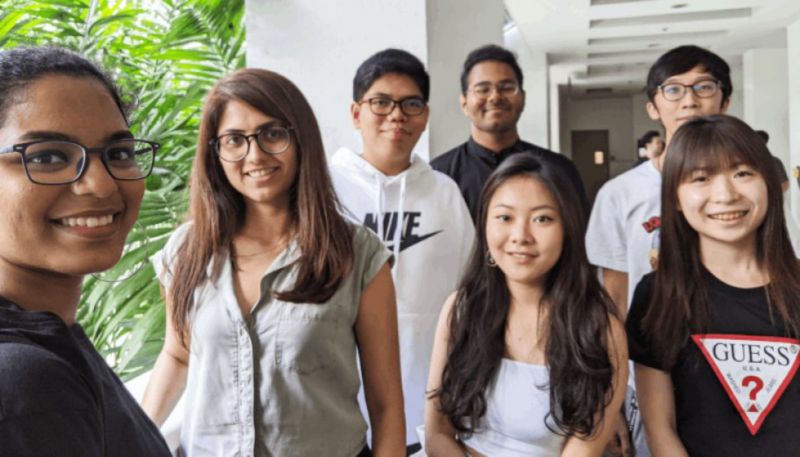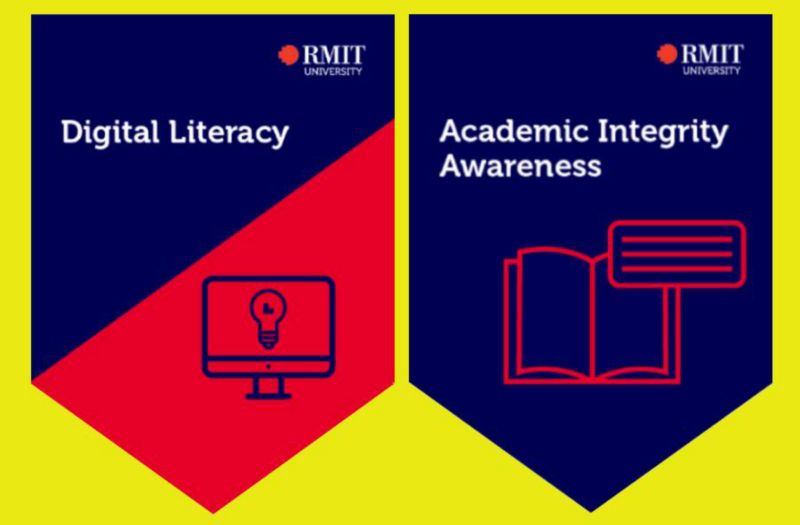The Library offers a range of training and customised workshops to help your students develop the skills needed to become lifelong learners.
Library study support workshops
Let us collaborate in developing customised classes and resources to improve your students research skills. For more information, contact us at studysupport@rmit.edu.au

Focusing on the needs of your students
- We can deliver online assessment-focused workshops for library information literacy, academic writing, STEM and study skills.
- Workshops are designed for vocational education, undergraduate and postgraduate coursework students.
- Please provide a minimum of two weeks advance notice to allow planning and preparation time.
Study support for academically at-risk students
Referral service

For academically at-risk students, take advantage of our referral service to assist the Study Support team in contacting these students directly.
Our study support package includes one-to-one consultations with academic skills advisors and librarians, and an option to embed workshops in your course to address specific skills gaps.
What's in our study support package
One-on-one consultations with an academic skills advisor or librarian
We can help your students with their research, referencing, English language, writing skills, math and science queries, or study techniques.
Students can connect online and request help via our video chat platform, or upload their assignments to receive feedback and advice on how to improve their work. They can also get help in person at the Study Support Hub in Swanston and Bundoora Library.
Embedded workshops for skills gaps
Email studysupport@rmit.edu.au to organise a workshop with an academic skills advisor and/or a librarian.
If you’ve identified skills gap in your students, the Study Support team can help by providing embedded workshops. These workshops can be targeted to specific areas within the curriculum that students may have difficulty with. Offering these workshops within a course provides valuable contextual support and can be related to assessments.
Some examples of embedded workshops include maths calculations for nursing students, statistics for business students, Python for computer science students, and research for literature reviews.
Study support referral form
Students helping students
Peer mentoring

Peer mentoring is a student led study support program run by the Library.
Peer mentors are students who have been trained to support other students in their learning. They help fellow students set up for success in a safe and inclusive environment that fosters participation and belonging to the RMIT community. Mentors can help with skill and confidence building, provide ongoing support, progress checks and advice. The program offers a means to interpret course material in a way that is socially and culturally relevant to the immediate student experience. All levels of RMIT students from VE through to PhD are involved.
About the peer mentoring program
The program is global and delivered fully online through the Vygo mentoring app. Vygo allows for instant messaging, face-to-face meetings, screen and document sharing, mentor feedback and ratings.
Mentors and mentees can connect with each other regardless of physical location.
How do peer mentors benefit?
The program enables peer mentors to consolidate the knowledge they have acquired in your course through discussion and guidance with students currently learning the material. They develop confidence through improved communication skills and can build their cultural awareness through connecting with a broad range of students in the global RMIT community.
Mentor requirements
- 75%+ grade in any course they support
- Completion of the Peer Mentoring micro-credential
- Attend face to face training session with the team for Vygo platform onboarding
- Obtain a Volunteer Working With Children Check if based in Australia.
Mentor recognition
- Digital Badge
- Certificate at end of semester
- Ongoing support and feedback
What don’t mentors do?
- They do not teach or tutor.
- They do not proofread.
- They do not provide answers to assessable material.
How do peer mentors help your students?
- Primarily, peer mentors help your students become more confident academically.
- ‘It’s a safe space to ask dumb questions’ - direct quote from a student
- They can discuss how to start assignments, how to plan, how to succeed, what to avoid.
- International students can gain a better understanding of the Australian education system and RMIT’s academic expectations.
- They provide a sense of belonging to the RMIT community through shared experience.
- Sometimes they provide campus tours, introductions to RUSU groups and become friends.
Peer mentoring and your course
How does peer mentoring help academics and teachers?
Peer mentors can be a first port of call for your students needing help with your course, which will free up some of your time. Through discussion with others your students will also become more confident academically which can mean better grades.
How do I set up peer mentoring for my course?
- Contact peer.mentoring@rmit.edu.au to let them know you would like to add a course. Someone from the team can schedule a brief meeting if you would like to discuss.
- Courses need to be confirmed at least 4 weeks prior to semester starting.
- Peer mentoring can only run if enough students volunteer from your course.
What does the Library peer mentoring team do?
- The Library peer mentoring team provides administrative support to run the program, this includes:
- Recruitment and training of peer mentors.
- Provision of promotional materials including image slides and text for canvas announcements.
- Weekly engagement report for your course and end of semester infographic report.
- Drop-in 'demystifying peer mentoring’ session for your students.
What is the time commitment for academics?
Minimal, all we require is for you to let us know if you would like your course supported 4 weeks prior to semester and encourage you students to seek out a peer mentor.
| Activity | Time frame | Academic | Library Peer Mentoring team |
|---|---|---|---|
| Confirm courses | Pre-semester | yes | no |
| Recruit peer mentors | Pre-semester | no | yes |
| Train peer mentors | Weeks O, 1 and 2 | no | yes |
| Promote peer mentoring | Week 2 onwards | yes | yes |
| Weekly reporting | Week 3 onwards | no | yes |
| Feedback for peer mentors | Week 2 onwards | no | yes |
Promoting peer mentoring to your students
Please help us promote the benefits of peer mentoring by encouraging your students to seek mentorships.
Micro-credentials
Library micro-credentials

Help your students become aware of digital literacy and academic integrity by embedding these Library micro-credentials into your course.
Speak with your College Creds Specialist or email the Library Creds Team at library.creds@rmit.edu.au for more information.
Watch the Library Shorts video for instructions on how to embed Library Creds in your course.
Digital literacy creds
The Library has developed a set of ten Digital Literacy micro-credentials (creds). Any RMIT student can register to take the Digital Literacy creds. Each credential can be completed separately.
Find out more about the content of the Library's creds and how you can use them in your courses and programs.
Academic integrity awareness cred
The Academic Integrity Awareness credential (cred) explains the concept of academic integrity and its significance within and beyond the university. As part of this credential, students explore the importance of doing one's own work while acknowledging how other people's ideas have influenced their thinking and writing.
Online guides and tutorials
Self-paced learning options

Help improve your students' general academic study skills, assessment tasks, writing, maths, and science skills by linking to and using available resources from the Learning Lab.
Embed ready-to-go-videos and online resources from LinkedIn Learning that cover topics on teamwork, leadership, project management, IT skill development, etc. into your Canvas course.
Check the tabs for details and point your students to the Study support section for more helpful resources.
Learning Lab: online study resources
The RMIT Learning Lab has online resources designed to help your students improve their general academic study skills, as well as writing, maths, statistics, physics and chemistry skills.
LinkedIn Learning
LinkedIn Learning's Online training library offers access to training sessions in streaming video covering a variety of software products and digital technologies.
Explore the following modules and others available from LinkedIn Learning. They cover key business skills, including business software, project management and leadership, communication, emotional intelligence, and more. Learn how to use new elearning technologies and how to manage your time.
Assignment Planner
Our Assignment Planner will give your students a step-by-step plan with tips and advice to help them complete their presentations and written assignments on time. Students can save, print, or import plans into their personal calendar.

